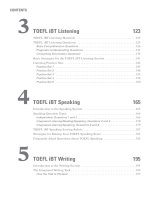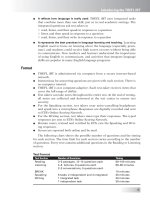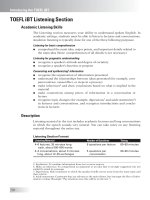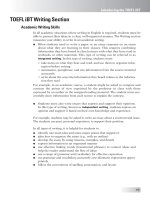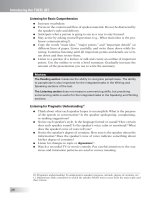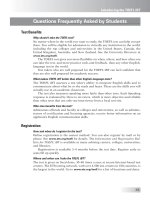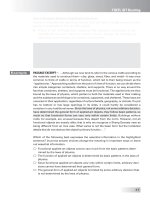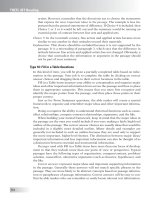The official guide to the toefl ibt third edition part 36 ppt
Bạn đang xem bản rút gọn của tài liệu. Xem và tải ngay bản đầy đủ của tài liệu tại đây (80.38 KB, 7 trang )
236
TOEFL iBT Practice Test 1
Whigs, on the other hand, were more comfortable with the market. For them, com-
merce and economic development were agents of civilization. Nor did the Whigs en-
vision any conflict in society between farmers and workers on the one hand and
businesspeople and bankers on the other. Economic growth would benefit everyone
by raising national income and expanding opportunity. The government’s responsibil-
ity was to provide a well-regulated economy that guaranteed opportunity for citizens
of ability.
4. According to paragraph 3, Whigs believed that commerce and economic devel-
opment would have which of the following effects on society?
ɕ
They would promote the advancement of society as a whole.
ɕ
They would cause disagreements between Whigs and Democrats.
ɕ
They would supply new positions for Whig Party members.
ɕ
They would prevent conflict between farmers and workers.
5. According to paragraph 3, which of the following describes the Whig Party’s view
of the role of government?
ɕ
To regulate the continuing conflict between farmers and businesspeople
ɕ
To restrict the changes brought about by the market
ɕ
To maintain an economy that allowed all capable citizens to benefit
ɕ
To reduce the emphasis on economic development
Whigs and Democrats differed not only in their attitudes toward the market but also
about how active the central government should be in people’s lives. Despite Andrew
Jackson’s inclination to be a strong President, Democrats as a rule believed in limited
government. Government’s role in the economy was to promote competition by de-
stroying monopolies
1
and special privileges. In keeping with this philosophy of limited
government, Democrats also rejected the idea that moral beliefs were the proper
sphere of government action. Religion and politics, they believed, should be kept
clearly separate, and they generally opposed humanitarian legislation.
6. The word inclination in the passage is closest in meaning to
ɕ
argument
ɕ
tendency
ɕ
example
ɕ
warning
7. According to paragraph 4, a Democrat would be most likely to support govern-
ment action in which of the following areas?
ɕ
Creating a state religion
ɕ
Supporting humanitarian legislation
ɕ
Destroying monopolies
ɕ
Recommending particular moral beliefs
1. Monopolies—Companies or individuals that exclusively own or control commercial enterprises
with no competitors
P
A
R
A
G
R
A
P
H
3
P
A
R
A
G
R
A
P
H
4
The Whigs, in contrast, viewed government power positively. They believed that it
should be used to protect individual rights and public liberty, and that it had a special
role where individual effort was ineffective. By regulating the economy and competi-
tion, the government could ensure equal opportunity. Indeed, for Whigs the concept
of government promoting the general welfare went beyond the economy. In particu-
lar, Whigs in the northern sections of the United States also believed that government
power should be used to foster the moral welfare of the country. They were much
more likely to favor social-reform legislation and aid to education.
8. The word concept in the passage is closest in meaning to
ɕ
power
ɕ
reality
ɕ
difficulty
ɕ
idea
9. Which of the following can be inferred from paragraph 5 about variations in
political beliefs within the Whig Party?
ɕ
They were focused on issues of public liberty.
ɕ
They caused some members to leave the Whig party.
ɕ
They were unimportant to most Whigs.
ɕ
They reflected regional interests.
237
Reading
GO ON TO THE NEXT PAGE g
P
A
R
A
G
R
A
P
H
5
In some ways the social makeup of the two parties was similar. To be competitive in
winning votes, Whigs and Democrats both had to have significant support among
farmers, the largest group in society, and workers. Neither party could win an election
by appealing exclusively to the rich or the poor. The Whigs, however, enjoyed dispro-
portionate strength among the business and commercial classes. Whigs appealed to
planters who needed credit to finance their cotton and rice trade in the world market,
to farmers who were eager to sell their surpluses, and to workers who wished to im-
prove themselves. Democrats attracted farmers isolated from the market or uncom-
fortable with it, workers alienated from the emerging industrial system, and rising
entrepreneurs who wanted to break monopolies and open the economy to newcom-
ers like themselves. The Whigs were strongest in the towns, cities, and those rural
areas that were fully integrated into the market economy, whereas Democrats domi-
nated areas of semisubsistence farming that were more isolated and languishing eco-
nomically.
10. According to paragraph 6, the Democrats were supported by all of the following
groups EXCEPT
ɕ
workers unhappy with the new industrial system
ɕ
planters involved in international trade
ɕ
rising entrepreneurs
ɕ
individuals seeking to open the economy to newcomers
11. Which of the sentences below best expresses the essential information in the
highlighted sentence in the passage?
Incorrect
choices change the meaning in
important ways or leave out essential information.
ɕ
Whigs were able to attract support only in the wealthiest parts of the economy
because Democrats dominated in other areas.
ɕ
Whig and Democratic areas of influence were naturally split between urban and
rural areas, respectively.
ɕ
The semisubsistence farming areas dominated by Democrats became increas-
ingly isolated by the Whigs’ control of the market economy.
ɕ
The Democrats’ power was greatest in poorer areas while the Whigs were
strongest in those areas where the market was already fully operating.
238
TOEFL iBT Practice Test 1
P
A
R
A
G
R
A
P
H
6
During Jackson’s second term, his opponents had gradually come together to form
the Whig party.
7
Whigs and Democrats held different attitudes toward the changes
brought about by the market, banks, and commerce.
7
The Democrats tended to view
society as a continuing conflict between “the people”—farmers, planters, and work-
ers—and a set of greedy aristocrats.
7
This “paper money aristocracy” of bankers and
investors manipulated the banking system for their own profit, Democrats claimed,
and sapped the nation’s virtue by encouraging speculation and the desire for sudden,
unearned wealth.
7
The Democrats wanted the rewards of the market without sacri-
ficing the features of a simple agrarian republic. They wanted the wealth that the mar-
ket offered without the competitive, changing society; the complex dealing; the
dominance of urban centers; and the loss of independence that came with it.
12. Look at the four squares [
7
] that indicate where the following sentence can be
added to the passage.
This new party argued against the policies of Jackson and his party in a
number of important areas, beginning with the economy.
Where would the sentence best fit?
ɕ
During Jackson’s second term, his opponents had gradually come together to
form the Whig party. This new party argued against the policies of Jackson and
his party in a number of important areas, beginning with the economy. Whigs
and Democrats held different attitudes toward the changes brought about by the
market, banks, and commerce.
7
The Democrats tended to view society as a con-
tinuing conflict between “the people”—farmers, planters, and workers—and a set
of greedy aristocrats.
7
This “paper money aristocracy” of bankers and investors
manipulated the banking system for their own profit, Democrats claimed, and
sapped the nation’s virtue by encouraging speculation and the desire for sudden,
unearned wealth.
7
The Democrats wanted the rewards of the market without
sacrificing the features of a simple agrarian republic. They wanted the wealth
that the market offered without the competitive, changing society; the complex
dealing; the dominance of urban centers; and the loss of independence that came
with it.
ɕ
During Jackson’s second term, his opponents had gradually come together to
form the Whig party.
7
Whigs and Democrats held different attitudes toward the
changes brought about by the market, banks, and commerce. This new party
argued against the policies of Jackson and his party in a number of important
areas, beginning with the economy. The Democrats tended to view society as a
continuing conflict between “the people”—farmers, planters, and workers—and
a set of greedy aristocrats.
7
This “paper money aristocracy” of bankers and in-
vestors manipulated the banking system for their own profit, Democrats claimed,
and sapped the nation’s virtue by encouraging speculation and the desire for
sudden, unearned wealth.
7
The Democrats wanted the rewards of the market
239
Reading
GO ON TO THE NEXT PAGE g
P
A
R
A
G
R
A
P
H
2
without sacrificing the features of a simple agrarian republic. They wanted the
wealth that the market offered without the competitive, changing society; the
complex dealing; the dominance of urban centers; and the loss of independence
that came with it.
ɕ
During Jackson’s second term, his opponents had gradually come together to
form the Whig party.
7
Whigs and Democrats held different attitudes toward the
changes brought about by the market, banks, and commerce.
7
The Democrats
tended to view society as a continuing conflict between “the people”—farmers,
planters, and workers—and a set of greedy aristocrats. This new party argued
against the policies of Jackson and his party in a number of important areas,
beginning with the economy. This “paper money aristocracy” of bankers and in-
vestors manipulated the banking system for their own profit, Democrats claimed,
and sapped the nation’s virtue by encouraging speculation and the desire for
sudden, unearned wealth.
7
The Democrats wanted the rewards of the market
without sacrificing the features of a simple agrarian republic. They wanted the
wealth that the market offered without the competitive, changing society; the
complex dealing; the dominance of urban centers; and the loss of independence
that came with it.
ɕ
During Jackson’s second term, his opponents had gradually come together to
form the Whig party.
7
Whigs and Democrats held different attitudes toward the
changes brought about by the market, banks, and commerce.
7
The Democrats
tended to view society as a continuing conflict between “the people”—farmers,
planters, and workers—and a set of greedy aristocrats.
7
This “paper money
aristocracy” of bankers and investors manipulated the banking system for their
own profit, Democrats claimed, and sapped the nation’s virtue by encouraging
speculation and the desire for sudden, unearned wealth. This new party argued
against the policies of Jackson and his party in a number of important areas,
beginning with the economy. The Democrats wanted the rewards of the market
without sacrificing the features of a simple agrarian republic. They wanted the
wealth that the market offered without the competitive, changing society; the
complex dealing; the dominance of urban centers; and the loss of independence
that came with it.
240
TOEFL iBT Practice Test 1
13. Directions:
An introductory sentence for a brief summary of the passage is pro-
vided below. Complete the summary by selecting the THREE answer choices
that express the most important ideas in the passage. Some answer choices do
not belong in the summary because they express ideas that are not presented in
the passage or are minor ideas in the passage.
This question is worth 2 points.
The political system of the United States in the mid-nineteenth century was
strongly influenced by the social and economic circumstances of the time.
b
b
b
Answer Choices
241
Reading
GO ON TO THE NEXT PAGE g
1. The Democratic and Whig Parties
developed in response to the needs
of competing economic and political
constituencies.
2. During Andrew Jackson’s two terms
as President, he served as leader
of both the Democratic and Whig
Parties.
3. The Democratic Party primarily rep-
resented the interests of the market,
banks, and commerce.
4. In contrast to the Democrats, the
Whigs favored government aid for
education.
5. A fundamental difference between
Whigs and Democrats involved the
importance of the market in society.
6. The role of government in the lives
of the people was an important
political distinction between the two
parties.
THE EXPRESSION OF EMOTIONS
Joy and sadness are experienced by people in all cultures around the world, but how
can we tell when other people are happy or despondent? It turns out that the expres-
sion of many emotions may be universal. Smiling is apparently a universal sign of
friendliness and approval. Baring the teeth in a hostile way, as noted by Charles
Darwin in the nineteenth century, may be a universal sign of anger. As the originator
of the theory of evolution, Darwin believed that the universal recognition of facial
expressions would have survival value. For example, facial expressions could signal
the approach of enemies (or friends) in the absence of language.
Most investigators concur that certain facial expressions suggest the same emo-
tions in all people. Moreover, people in diverse cultures recognize the emotions man-
ifested by the facial expressions. In classic research Paul Ekman took photographs of
people exhibiting the emotions of anger, disgust, fear, happiness, and sadness. He
then asked people around the world to indicate what emotions were being depicted in
them. Those queried ranged from European college students to members of the Fore,
a tribe that dwells in the New Guinea highlands. All groups, including the Fore, who
had almost no contact with Western culture, agreed on the portrayed emotions. The
Fore also displayed familiar facial expressions when asked how they would respond if
they were the characters in stories that called for basic emotional responses. Ekman
and his colleagues more recently obtained similar results in a study of ten cultures in
which participants were permitted to report that multiple emotions were shown by
facial expressions. The participants generally agreed on which two emotions were
being shown and which emotion was more intense.
Psychological researchers generally recognize that facial expressions reflect emo-
tional states. In fact, various emotional states give rise to certain patterns of electrical
activity in the facial muscles and in the brain. The facial-feedback hypothesis argues,
however, that the causal relationship between emotions and facial expressions can
also work in the opposite direction. According to this hypothesis, signals from the fa-
cial muscles (“feedback”) are sent back to emotion centers of the brain, and so a per-
son’s facial expression can influence that person’s emotional state. Consider Darwin’s
words: “The free expression by outward signs of an emotion intensifies it. On the
other hand, the repression, as far as possible, of all outward signs softens our emo-
tions.” Can smiling give rise to feelings of good will, for example, and frowning to
anger?
Psychological research has given rise to some interesting findings concerning the
facial-feedback hypothesis. Causing participants in experiments to smile, for example,
leads them to report more positive feelings and to rate cartoons (humorous drawings
of people or situations) as being more humorous. When they are caused to frown,
they rate cartoons as being more aggressive.
What are the possible links between facial expressions and emotion? One link is
arousal, which is the level of activity or preparedness for activity in an organism. In-
tense contraction of facial muscles, such as those used in signifying fear, heightens
arousal. Self-perception of heightened arousal then leads to heightened emotional ac-
tivity. Other links may involve changes in brain temperature and the release of neuro-
transmitters (substances that transmit nerve impulses.) The contraction of facial
muscles both influences the internal emotional state and reflects it. Ekman has found
that the so-called Duchenne smile, which is characterized by “crow’s feet” wrinkles
242
TOEFL iBT Practice Test 1

